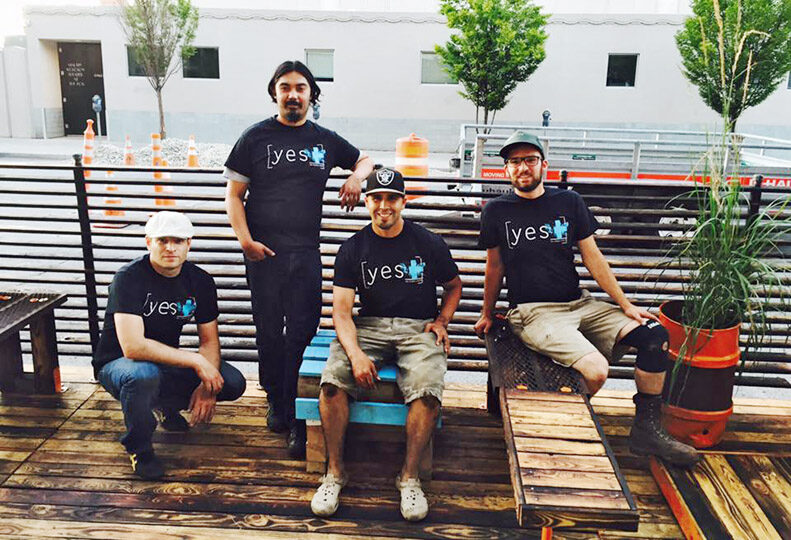
Home » Parklet structures might become permanent option in Spokane
Parklet structures might become permanent option in Spokane
Nonprofit studio plans future public spaces

May 25, 2017
For the past two years, Spokane residents and visitors alike have enjoyed the use of parklets, small, parking-spot sized, wooden seating and dining areas strategically placed in front of businesses throughout the city.
Now, according to one architect here, what started as a unique design trend may soon become part of a new city ordinance governing when and where parklets can be installed.
Jose Barajas is an architect with Integrus Architecture PS, of Spokane, who also works with Yes-You Express Studio, a nonprofit organization that began the parklet program here in 2015.
He says the studio, which started as a group of friends designing and building spaces for fun, has now created a program that might leave a permanent mark on the city.
“We’d seen this kind of thing work well in cities like Portland, Seattle, and San Francisco, and wanted to create something similar here,” he says. “Now we’re working with the city to allow these spaces to continue.”
Barajas says the studio started by designing a small parklet prototype out of old pallets, eventually displaying it near the Garland Theater. Following that initial design, it created another parklet space that was displayed at an annual art gallery event sponsored by Terrain, a nonprofit organization here supporting the arts community, that’s now located in the old Washington Cracker Co. building at 304 W. Pacific .
“Eventually we gained enough support to pitch a pilot program to the city,” he says. “We had a lot of help from the Downtown Spokane Partnership in terms of advice, and some initial funding.”
Now, with the pilot program set to end after this summer, Barajas says the studio has been working with the city to create a permanent ordinance governing the parklets.
“Right now we own and insure all the parklet spaces,” he says. “But we’re hoping to help create a kind of permitting process through which businesses could apply to create their own parklet space.”
According to Barajas, if the ordinance is adopted, businesses would be responsible for supplying materials to construct the parklets, and then would own and be responsible for setup, teardown, and maintenance of the space.
He says so far the city of Spokane is still working to create guidelines and rules for such an ordinance, and might consult Yes-You Express Studio for input. He says the studio also would be willing to serve as consultants in both design and construction of future parklet spaces.
Barajas says he sees parklets as a tool for encouraging economic development, because they encourage people to stay longer and enjoy both businesses and the surrounding neighborhoods.
“Some people really like them, others get upset over lack of a parking space,” he says. “Ultimately I think these spaces help people visualize what a space could be, rather than what it’s always been. It creates a kind of forward thinking, which is something we need more of if we’re to become a truly innovative, awesome city.”
Barajas says the city of Spokane currently allows Yes-You Express studio to submit a packet detailing proposed parklet locations, site plans and construction drawings for approval. Parklets usually are in place between May and October.
He says the studio currently has three parklet units, all of which are mobile and can be set up or torn down within three hours.
“We’re able to setup or take down these areas within hours, which is very convenient, especially when big events like Hoopfest come to town,” he says.
He says this year the studio plans to use all three parklet structures. It already has installed one outside Vessel Coffee Roasters at 2823 N. Monroe.
Later this month, a second parklet will be placed at the Gathering House, a church and coffee shop at 733 W. Garland, and in June a third, larger parklet will be situated in front of two downtown restaurants, Nudo Ramen House and Fire Artisan Pizza, along west Sprague Avenue between Lincoln and Post streets.
Although it still plans to stay involved with design work for parklet program, Barajas says the studio also is looking to pursue other new, creative design ideas for urban spaces.
“Our next idea is something we’re calling music box,” he says. “This project will involve using a former shipping container as an outdoor concert stage setup.”
Latest News Up Close
Related Articles
Related Products
Related Events

![Brad head shot[1] web](https://www.spokanejournal.com/ext/resources/2025/03/10/thumb/Brad-Head-Shot[1]_web.jpg?1741642753)


